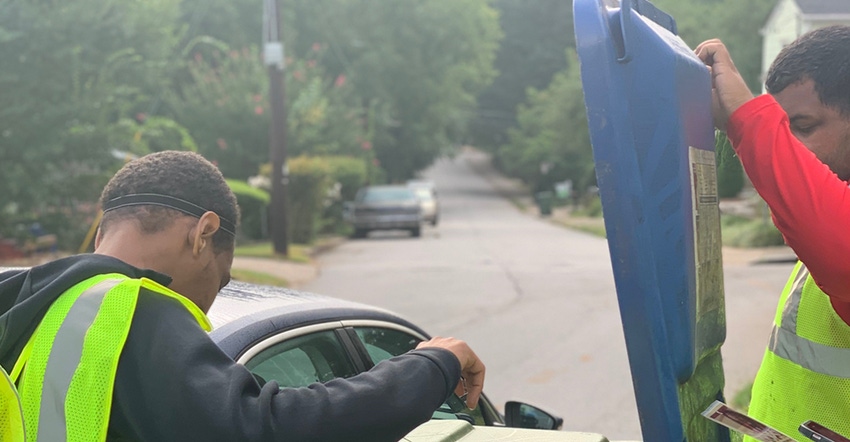Atlanta’s Multipronged Approach to Bumping Up Recycling

Every municipality faces unique recycling challenges, driven by geography, demographics, infrastructure, and/ or policy. Yet they fight some of the same battles. Waste360 talked to recycling pros in Atlanta and New York City about their hurdles and how they are trying to push past them. This article tells some of Atlanta’s story. Come back tomorrow to learn about New York City.
Atlanta, Ga. has a vigorous recycling mandate, but a not-as-robust recycling infrastructure. Residents of single-family homes and of multifamily dwellings with at least six units are required to recycle; half of the city’s roughly 508,000 residents live in multiunit buildings, many who have no access to at-home collections and must go to the city’s one and only drop off.
The city is going at this access issue and other recycling problems via multiple tactics, from customizing recycling approaches based on type of residence, to aggressive anti-contamination campaigns.
Where Atlanta is really bearing down is on reaching the underserved—multifamily buildings and colleges, among others.
“The City of Atlanta has great access for single-family residents, but we want to offer access to everyone,” says Kanika Greenlee, environmental programs director for the City of Atlanta, Public Works.
Reaching different demographics has been hard; even getting through to people who want to recycle has its barriers. Greenlee illuminates this point with two examples.
“There are transient populations. Recycling systems are local, so if residents move 10 miles away it may be done differently. We want to make sure people know how to recycle right as they relocate,” says Greenlee.
“We also know that seniors are interested in recycling. But they often do not live in the social media world to the extent that other generations do. So, while this venue works for many people and is cost effective, we want to find other economical ways to reach seniors.”
Thinking of the folks who do spend time online, the Department of Public Works invested in ReCollect’s web-based app called Waste Wizard, designed to help cut contamination. It’s a digital recycling search engine whereby users enter specific items to learn what to do with them.
“People can put in items and get options, whether to throw it in the trash or to recycle. And if it’s recyclable they learn [for instance] if they should take it to a drop-off or if it can go to retail outlets. Or if they have curbside collections, they discover what can go in their carts at home,” says Greenlee.
Residents who don’t have the app can call the city’s information line and staff will search for them.
The city had 150,000 materials searched from June 2018 to Dec 2020 and reviews these searches monthly, paying special attention to the top items and adding five to 25 of them a month.
Atlanta has deployed a more “old fashioned” method too—pen and paper (or tags) through a program called Feet on the Street. Through this initiative city contractors leave “oops” tags when they find something in a cart that doesn’t belong.
“What we learned from Feet on the Street is that rejecting contaminated carts works. We learned people want to do the right thing, and if you give them tools, typically, they will. But we discovered you have to make it easy and accessible. And we hope the Waste Wizard will help with that,” says Greenlee.
Atlanta’s Public Works department got a grant through The Recycling Partnership (TRP) that is focused on improving participation and cutting contamination in multiple residential sectors including single-family, multifamily, and colleges and universities.
“Each of these sectors presents unique infrastructure and behavior change challenges, and this grant looks to address those unique challenges,” says Craig Wittig, director of Community Programs, The Recycling Partnership.
Atlanta has found it can have most impact by engaging and informing its citizens, which is not unique to this region, attests Wittig.
TRP helps municipalities leverage outreach and education to ensure its residents understand their options and to answer their questions, for instance about collection schedules, which especially through COVID-19 may have changed. In some regions they may for now be expected to go to drop off sites and may need clarification on when they’re open, where they are, and whether the same materials are accepted, says Wittig.
“Even when there are no changes people do not inherently understand what and how to recycle. There are gaps in understanding. And continued outreach is important to fill those gaps,” he says.
Meanwhile, Atlanta is seeing some promising emerging trends.
“We have had increased recyclable tonnage of materials that we really want. We do not know if this is from Waste Wizard or from Feet on the Street or other measures. It could be a combination of several things. We are hopeful that taking a multifaceted approach to improve recycling will yield great results,” says Greenlee.
About the Author(s)
You May Also Like




